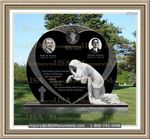|
Designing A Memorial Program And Saying Last Words
When you lose a loved one to death, a funeral ceremony offers a formal way to say goodbye. Such services should be personalized to reflect the life of the individual. The mortuary you use offers assistance in planning an appropriate service for your loved one.
Music is often an important part of services. You may choose someone to sing or play an instrument live. The use of prerecorded music has become very common in many areas. In addition, the mortuary may have an organist on staff.
There is usually a eulogist or officiant for the service. This person may be a clergy member, family friend or even a member of the family. The family is generally responsible to communicate with the individual in planning the service. In some cases, families need help in contacting a person who can do this job. Most mortuaries offer assistance. Keep in mind that some religious ceremonies may include specifics as to what is included in the services.
If your family member was a member of a fraternal group or in the military, these groups may take part in the service. Some fraternal groups offer services that are specific to the organization. Veterans groups may provide a final playing of taps, a 21 gun salute and present a flag to the survivors.
Families can also determine if they want to have a viewing as a part of the service. One option that is becoming more popular is the memorial service, in which the body is already cremated or buried and not at the service. However, these are personal decisions for the family.
Saying goodbye to a loved one who has passed is often difficult emotionally, but, for many, an important part of the grieving process. Plans for a funeral ceremony should be discussed before the loved one passes if possible. This allows you to plan a service you know your loved one would have approved.
|
|



























